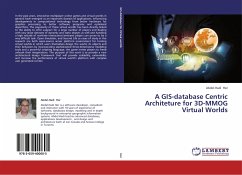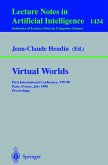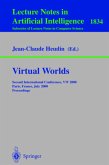In the past years, interactive multiplayer online games and virtual worlds in general have emerged as an important domain of applications, influencing developments in computational technology from better hardware for graphics processing to better software programs and optimized algorithms. The popularity of these virtual worlds has been directly linked to the ability to offer support for a large number of players and dealing with very large datasets of dynamic and static objects as well and handling a high volume of real-time interactions between players can prove to be a very difficult task. Open-Simulator, and Second Life as cases of study in this research are both open-source server platform environment for hosting virtual worlds in which users themselves design the world, its objects and their behaviors by incorporating sophisticated three-dimensional modeling tools and a powerful scripting language, the game invites players to freely unleash their imaginations. The purpose of this work is to provide a new architectural design framework that will provide scalability, extensibility and increase the performance of virtual world s platform with complex user generated conten
Bitte wählen Sie Ihr Anliegen aus.
Rechnungen
Retourenschein anfordern
Bestellstatus
Storno








